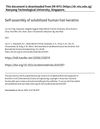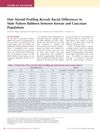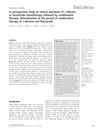 1 citations,
January 2019 in “Elsevier eBooks”
1 citations,
January 2019 in “Elsevier eBooks” Neuroactive steroids may affect the risk and treatment of alcohol use disorders.
 April 2021 in “IntechOpen eBooks”
April 2021 in “IntechOpen eBooks” Androgens, male hormones, affect physical and mental functions, with a decrease leading to health issues like muscle loss, bone disease, and depression, and more research is needed on long-term effects and treatments.
 3 citations,
March 2016 in “Phytotherapy Research”
3 citations,
March 2016 in “Phytotherapy Research” The new compound was more effective than finasteride in reducing markers of hair loss and prostate issues in cell tests.
 66 citations,
April 2017 in “International Journal of Andrology”
66 citations,
April 2017 in “International Journal of Andrology” Men taking 5α-reductase inhibitors for enlarged prostate have a higher chance of experiencing reduced sexual desire and erectile dysfunction.
 15 citations,
November 2015 in “Pharmacopsychiatry”
15 citations,
November 2015 in “Pharmacopsychiatry” α-Blockers and 5-ARIs for BPH can cause sexual dysfunction, including erectile and ejaculatory issues.
 7 citations,
December 2020 in “ACS biomaterials science & engineering”
7 citations,
December 2020 in “ACS biomaterials science & engineering” Human hair keratins can form stable nanofiber networks that might help in tissue regeneration.
 10 citations,
November 2012 in “The journal of investigative dermatology/Journal of investigative dermatology”
10 citations,
November 2012 in “The journal of investigative dermatology/Journal of investigative dermatology” Korean and Caucasian men with male pattern baldness have different hair steroid levels.
 5 citations,
May 2020 in “Pharmaceutical Research”
5 citations,
May 2020 in “Pharmaceutical Research” Heat and chemicals improve finasteride delivery to scalp and hair follicles, potentially enhancing treatment for hair loss.
 130 citations,
June 2003 in “Journal of Investigative Dermatology Symposium Proceedings”
130 citations,
June 2003 in “Journal of Investigative Dermatology Symposium Proceedings” Estrogen Receptor ß (ERß) is the main hormone controller in human skin and hair follicles, not Estrogen Receptor α (ERα) or the Androgen Receptor (AR).
March 2024 in “Nutrients” Alopecia Areata is linked to specific gut bacteria and metabolites, indicating a complex gut microbiome.
12 citations,
January 2022 in “Cells” Dermal papilla cell vesicles can boost hair growth genes in fat stem cells.
 April 2024 in “Cosmetics”
April 2024 in “Cosmetics” Different oils affect hair flexibility and strength, with their impact varying on whether hair is virgin or bleached.
 12 citations,
April 2008 in “Indian Journal of Dermatology”
12 citations,
April 2008 in “Indian Journal of Dermatology” There's no significant relationship between hair loss (androgenetic alopecia) and demodex infestation.
 January 2013 in “Российский журнал кожных и венерических болезней”
January 2013 in “Российский журнал кожных и венерических болезней” Androgenic alopecia, a common hair loss condition, is linked to changes in androgen metabolism and genetics, and can be treated with finasteride and minoxidil, but these treatments are only fully effective in 10% of patients.
 August 2024 in “Archives of Women s Mental Health”
August 2024 in “Archives of Women s Mental Health” Women with PCOS have more depression and stress due to high androgen levels, not obesity or insulin resistance.
April 2020 in “The journal of investigative dermatology/Journal of investigative dermatology” Certain surgical methods are better than routine incision for hidradenitis suppurativa, topical clindamycin and acitretin are effective treatments, men with HS have a risk of skin cancer, HS patients are more likely to die from heart problems, and specific genetic markers are linked to treatment response.
 21 citations,
November 2018 in “Journal of Psychosomatic Obstetrics & Gynecology”
21 citations,
November 2018 in “Journal of Psychosomatic Obstetrics & Gynecology” Women with PCOS have more emotional and body image issues than healthy women.
 160 citations,
January 2017 in “Development”
160 citations,
January 2017 in “Development” Blood vessels and specific genes help turn cartilage into bone when bones heal.
179 citations,
May 1982 in “The Journal of clinical investigation/The journal of clinical investigation” High levels of 3 alpha-diol glucuronide in the blood are a marker of increased androgen action in women with excessive hair growth of unknown cause.
 13 citations,
September 1986 in “Archives of Dermatology”
13 citations,
September 1986 in “Archives of Dermatology” Women with more 3α,17β-androstanediol glucuronide compared to sex hormone binding globulin are more likely to have female pattern baldness.
66 citations,
October 1987 in “The Journal of clinical endocrinology and metabolism/Journal of clinical endocrinology & metabolism” Measuring androstanediol glucuronide in blood is useful for assessing and tracking treatment in women with excessive hair growth.
64 citations,
March 1984 in “Journal of steroid biochemistry/Journal of Steroid Biochemistry” Cyproterone acetate effectively reduced hair growth in hirsute patients by lowering androgen levels and altering androgen metabolism.
 24 citations,
October 1994 in “Fertility and Sterility”
24 citations,
October 1994 in “Fertility and Sterility” People with hair loss may have different levels of certain hormones due to changes in hormone processing.
 44 citations,
July 2012 in “Endocrine Practice”
44 citations,
July 2012 in “Endocrine Practice” We need to learn more about 5α-reductases and neuroactive steroids to safely make drugs targeting these enzymes.
 10 citations,
October 2018 in “Sexual medicine reviews”
10 citations,
October 2018 in “Sexual medicine reviews” Men using hair loss drugs like finasteride may experience sexual side effects like erectile dysfunction, but it's unclear who will be affected and when. Treating depression and sexual symptoms is suggested, as these men often have higher rates of both. More research is needed to understand why these side effects occur.
 9 citations,
July 2011 in “The Journal of Sexual Medicine”
9 citations,
July 2011 in “The Journal of Sexual Medicine” Hair loss drugs like finasteride may cause lasting sexual and mood side effects, and more research is needed to understand these risks.
 18 citations,
March 2020 in “Frontiers in Neuroendocrinology”
18 citations,
March 2020 in “Frontiers in Neuroendocrinology” The enzymes 5α-reductase and 3α/β-hydroxysteroid oxidoreductase help create brain-active substances from progesterone and testosterone, which could be used for treatment, but more research is needed to ensure their safety and effectiveness.
 4 citations,
August 2021 in “Biomedicine & Pharmacotherapy”
4 citations,
August 2021 in “Biomedicine & Pharmacotherapy” 5-alpha reductase inhibitors, like finasteride and dutasteride, may cause depression, but more research is needed to understand why.
 3 citations,
April 2013 in “International Journal of Clinical Practice”
3 citations,
April 2013 in “International Journal of Clinical Practice” Combination therapy for 9+ months maintains symptom improvements after stopping alpha-blockers or finasteride.
 32 citations,
May 2010 in “Pharmacopsychiatry”
32 citations,
May 2010 in “Pharmacopsychiatry” Finasteride reduces new brain cells in male mice, possibly causing depression.
























